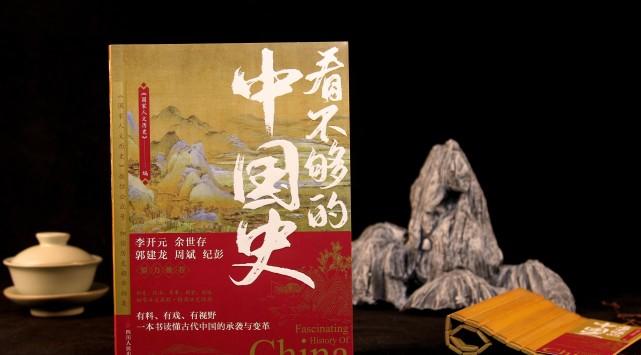Recently, the history book "Chinese History" published by The Sichuan People's Publishing House, curated by Xingwen Culture and published by Sichuan People's Publishing House, was listed for two weeks and quickly appeared on the historical list of major e-commerce companies, with a strong momentum. The book is a collection of 8 years of "Gao Zan" articles in the public account of the "National Humanities and History" magazine, inheriting the style of the magazine with material, drama and vision, and a book to understand the inheritance and transformation of ancient China.

Selected as "New List Most Collectible Public Account" for many consecutive years
"National Humanistic History" is a state-level semi-monthly current affairs and humanities semi-monthly magazine with "truth, fun and conscience" as the core value, sponsored by the people's daily, with the concept of "humanistic homeland, lasting newness", and has been rated as "China Post's Best-selling Newspaper" for many consecutive years. Won the "China's most beautiful journal", the national memory "annual historical and cultural brand", the third national "top 100 newspapers and periodicals" and other honors.
Sponsored by the New Media Center of National Humanistic History Magazine, the "National Humanistic History" WeChat public account is committed to disseminating the core values of "truth, fun and conscience", taking the news as the entry, taking history as the depth, and creating exclusive original articles with in-depth and unique professional interpretation, creating a new platform for readers to touch the body temperature of history and discover the truth of history.
The essence of the public account is collected to form "Chinese History That Can't See Enough"
China has a clear and continuous long history, and the number of historical classics and historical works can be called the world's first. If we want to see the path of Chinese history from this series of complex and profound questions, we need to have a complete, clear and concise understanding of Chinese history.
The essence of the "National Humanistic History" magazine published in the form of a physical book this time collects "Chinese History That Cannot Be Seen Enough", with the context of time and "change" as the core, providing a number of clear lines of development of Chinese history, selecting 5 major themes of system, economy, military, strategy, court, 53 topics with drama and material, and outlining the historical context of today's China's territorial territory, cultural thought, economic pattern, customs and human feelings, and legal system with witty language, unique perspective, and rigorous research. It can lead the reader to "deconstruct" Chinese history in a dissective manner.
According to Ke Wei, CEO of Fang Xingwen Culture, the main purpose of the book planning is to find a macro perspective, restore the internal logic of inheritance and change in ancient China, so that modern people can understand the development and achievements of today's China, the book contains a large number of representative articles of historical masters and scholars, the article articles take into account the historical rigor and readability, which is very suitable for history lovers to read.
A history of China can never be seen enough
A history of China is a history that cannot be seen enough. What is the view of "The History of China That Can't Be Seen Enough"? The writing of the book is novel and exciting, and many articles start from a question, each of which is dug deep from a small incision, telling history interlocking and vivid. For example, from the institutional chapter, why did the "independent enrollment" before the "national unified examination" in ancient times fail? Why did the "glory of the king" system of sealing Zen end in the Song Dynasty? From the economic chapters such as "The Ancient Version of the 'Oil War': Salt War", "The Burning of Money and Making Money by Emperor Wu of the Han Dynasty", we can understand what is not the best, only the most appropriate; from the "Why the "Death of the Son and the Noble Mother" System Cannot Curb the Dictatorship of the Empress" and other articles in the Chaotang chapter, we can see what is the people's hearts are not as good as water, and the flat land is turbulent; from the strategic articles "Why the Six Kingdoms Always Return home with feathers" and "Why Li Yuan decided the world for 7 years with 30,000 soldiers and horses", he experienced the internal strength and external softness From the military chapters "Lü Bu did not kill a famous general, why is he still called the "first fierce general" of the Three Kingdoms" and "Before the Battle of Jingnan began, no one guessed that Zhu Di would win" and other works, he lamented that attacking people was a strategy, and using soldiers to wisdom. Stretching out, characters, ideas, customs, artifacts... - one article after another, a Chinese history, can never be seen enough.
The publication of this book has been recognized and praised by professionals in the industry. Guo Jianlong, a well-known writer and social observer, believes that "the combination of popularity and professionalism is the reputation of the National Humanistic History that has been formed for a long time." This anthology also inherits its characteristics, saying that it is not enough to see, not only because it is well written, but also because it strives to deeply analyze Chinese history from five aspects, such as system, economy, personnel, strategy and military, guiding readers to think about many big issues, and sublimating in the story, which is the biggest feature of this book. ”
Text/Guangzhou Daily, New Flower City Reporter: Sun Jun
Photo/ Guangzhou Daily, New Flower City Reporter: Sun Jun
Video/Guangzhou Daily, New Flower City Reporter: Sun Jun
Guangzhou Daily Xinhuacheng editor Liu Liqin